Interested in learning more about the best Vitamin D3 and K2 supplements (for gut health)?
Today we are exploring the vitamin D supplement, maybe most noteworthy as the sunshine vitamin.
And then, of course, I’m going to share with you the best Vitamin D3 and K2 supplements (for gut health).
Before doing a short breakdown of vitamin D (and vitamin K), here is why they are important.
The Importance of Vitamin D
Most Americans are deficient in essential Vitamin D. Yet more and more studies are revealing why getting enough vitamin D is important.
This amazing vitamin helps to prevent osteoporosis (building strong bones), depression, cancer, diabetes, obesity and more.
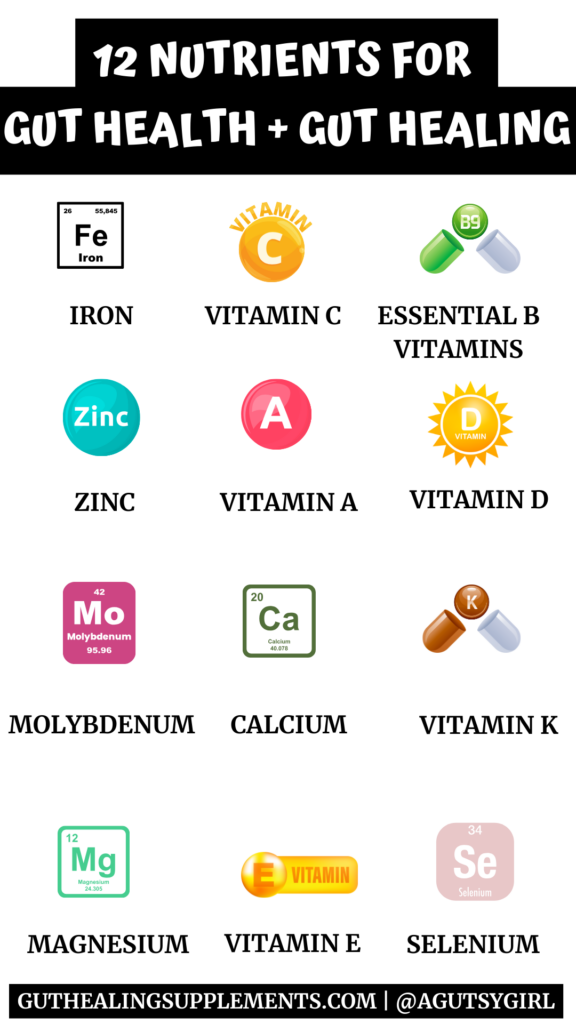
Here is what several doctors have to say about this crucial vitamin.
- Vitamin D represents the single most cost-effective medical intervention in the United States. (Dr. Greg Plotnikoff, Medical Director, Penny George Institute for Health and Healing, Abbott Northwestern Hospital in Minneapolis.)
- I believe [vitamin D] is the number one public health advance in medicine in the last twenty years. (Dr. John Whitcomb, Aurora Sinai Medical Center.)
- I would challenge anyone to find an area or nutrient or any factor that has such consistent anti-cancer benefits as vitamin D. The data are really quite remarkable. (Dr. Edward Giovannucci, Vitamin D expert.)
- In all my many years of practice of medicine, I’ve never seen one vitamin, even vitamin C, have such profound effects on human health. (Soram Khalsa MD.)
D3 Vitamin for Gut Health
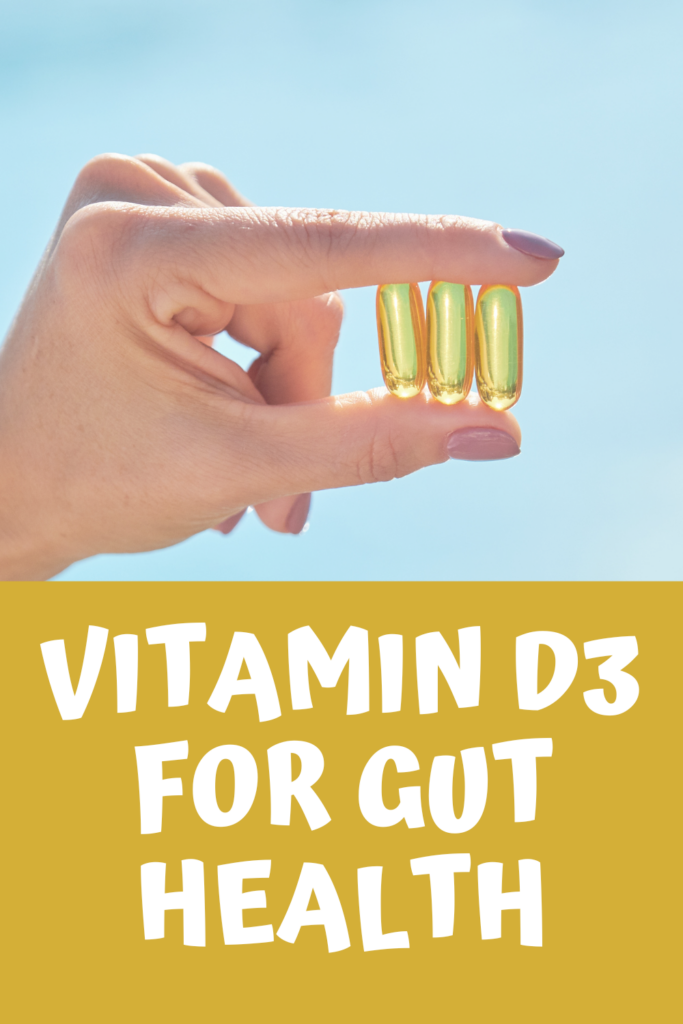
While most consider vitamin D the vitamin for healthy bones, there is some evidence that Vitamin D can regulate gastrointestinal inflammation and have positive impacts for the digestive tract.
Epidemiological studies show that individuals with higher serum Vitamin D have a lower incidence of IBD, particularly Crohn’s disease.
A deficiency in vitamin D leads to dysbiosis of the gut microbiome and has been reported to cause severe colitis.
However, there is another side to this as well. According to Harvard,
The vitamin D that is consumed in food or as a supplement is absorbed in the part of the small intestine immediately downstream from the stomach. Stomach juices, pancreatic secretions, bile from the liver, the integrity of the wall of the intestine — they all have some influence on how much of the vitamin is absorbed. Therefore, conditions that affect the gut and digestion, like celiac disease, chronic pancreatitis, Crohn’s disease, and cystic fibrosis, can reduce vitamin D absorption.
While vitamin D can be for gut health, Harvard suggests that without prior gut healing, you might not even be absorbing it.
The idea around D3 for gut health is sort of a chicken and egg scenario. In order to reap the benefits of this important nutrient, the state of your digestive system must be in good health.
This is typically the case with all digestive issues.
Is Vitamin D the Same as Vitamin D3?
I’ve been using the term vitamins D and D3. You’re wondering, “So are they the same thing?”
Kind of. Vitamin D3 is a form of vitamin D.
Vitamin D is found in supplements (and fortified foods) in two different forms: D2 (ergocalciferol) and D3 (cholecalciferol).
Both increase vitamin D in the blood.
However, these days vitamin D3 (cholecalciferol) seems to be more synonymous with vitamin D than vitamin D2 (ergocalciferol).
And here’s why.
What is Cholecalciferol? How about Ergocalciferol?
You may have seen the word Cholecalciferol used in place of Vitamin D3. The reason is simply that they are the same thing.
Cholecalciferol is a dietary supplement that is used to treat vitamin D deficiency. It is also used with calcium to maintain bone strength. It is produced in the human body.
In contrast, vitamin D2 (ergocalciferol) is not produced in the human body, but is created by exposing certain plant-derived materials to ultraviolet light.
Most studies show that vitamin D3 is more effective than vitamin D2 at raising blood levels of calcifediol.
For this reason, I decided to focus this article on vitamin D3 as the preferred form of vitamin D for gut health.
Vitamin D Supplementation
It has been proposed that the benefits of supplementation with Vitamin D in IBD because it can regulate homeostasis in the gut.
For patients who meet criteria for vitamin D supplementation (which is an entire argument in itself), vitamin D3 (cholecalciferol) should be selected over vitamin D2 (ergocalciferol).
The National Institutes of Health give the following recommended dietary allowances (in IU of Vitamin D) (Recommended Dietary Allowance).
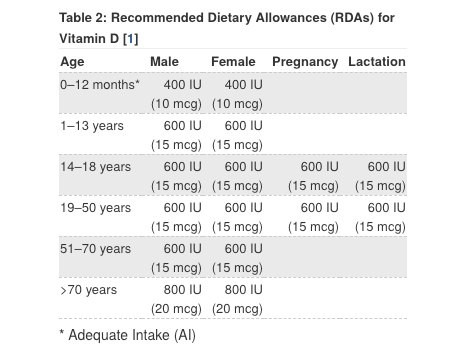
Keep in mind that you should always work with your healthcare provider to determine the right amount for you.
It’s easy to have your vitamin D levels checked.
With IBS and/or IBD, many times your healthcare professional will have you supplement with vitamin D (I always did, needing a high daily dose of vitamin D) and they will be able to give you the right dose.
Vitamin D3 Food Sources
It’s a common misconception that sun exposure is the only source of vitamin D.
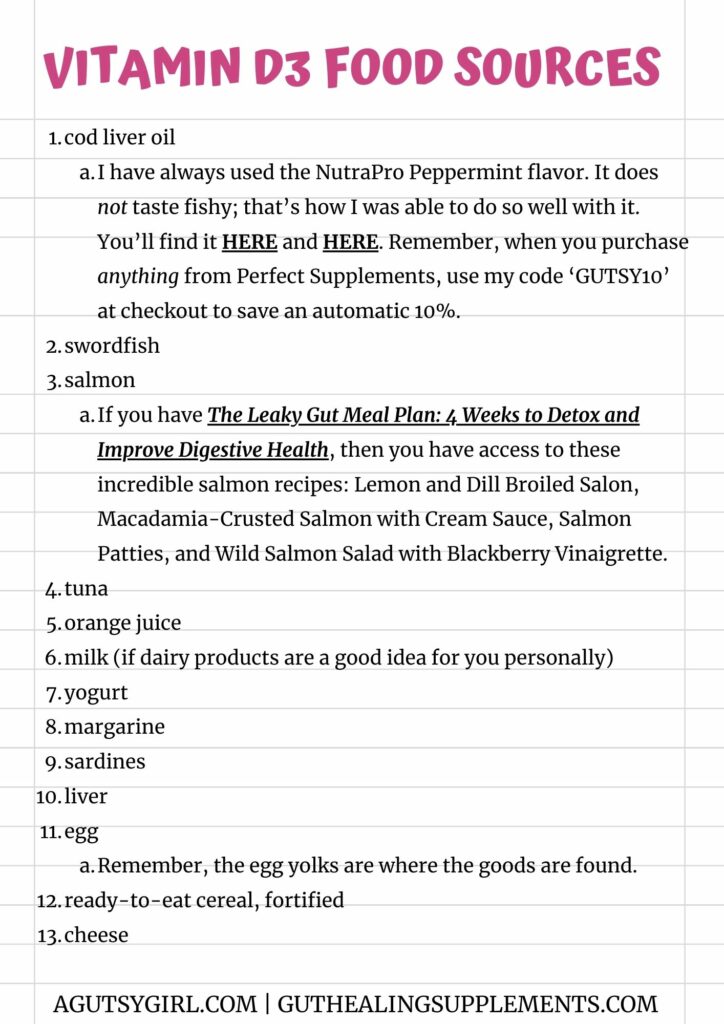
Here is a list of good vitamin D3 food sources:
- cod liver oil
- I have always used the NutraPro Peppermint flavor. It does not taste fishy; that’s how I was able to do so well with it. You’ll find it HERE and HERE. Remember, when you purchase anything from Perfect Supplements, use my code ‘GUTSY10’ at checkout to save an automatic 10%.
- Perfect Supplements has a ton of high-quality cod liver oil brands. Search the store HERE for cod liver oil to see them all.
- swordfish
- salmon
- If you have The Leaky Gut Meal Plan: 4 Weeks to Detox and Improve Digestive Health, then you have access to these incredible salmon recipes: Lemon and Dill Broiled Salon, Macadamia-Crusted Salmon with Cream Sauce, Salmon Patties, and Wild Salmon Salad with Blackberry Vinaigrette.
- tuna
- I get a high-quality, lower-priced option from Thrive Market
- orange juice
- milk (if dairy products are a good idea for you personally)
- yogurt
- margarine
- sardines
- liver
- egg
- Remember, the egg yolks are where the goods are found. I have written about this before HERE.
- ready-to-eat cereal, fortified
- cheese
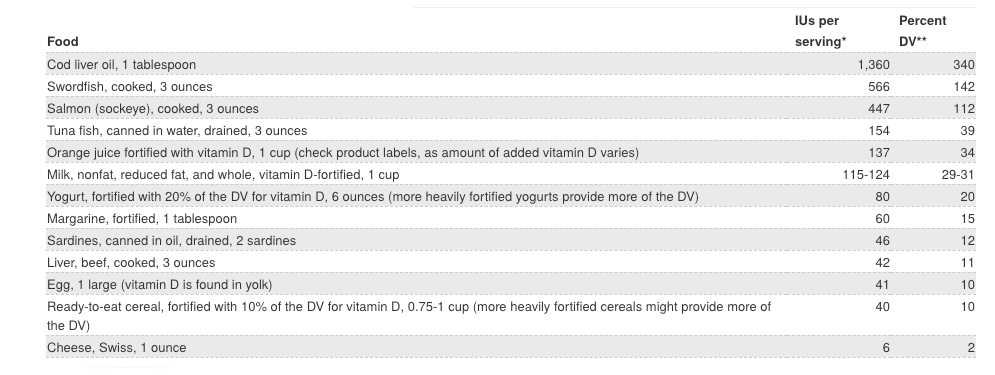
Wondering why mushrooms are not on this list? It’s because they are the D2 form.
Note: I am not saying I think you should run out and eat margarine. In fact, I don’t think you should choose margarine at all. I’m just giving you the food facts.
The Best Vitamin D3 and K2 Supplements (for Gut Health)
Click HERE to save the best vitamin D3 and K2 supplements (for gut health) for later.
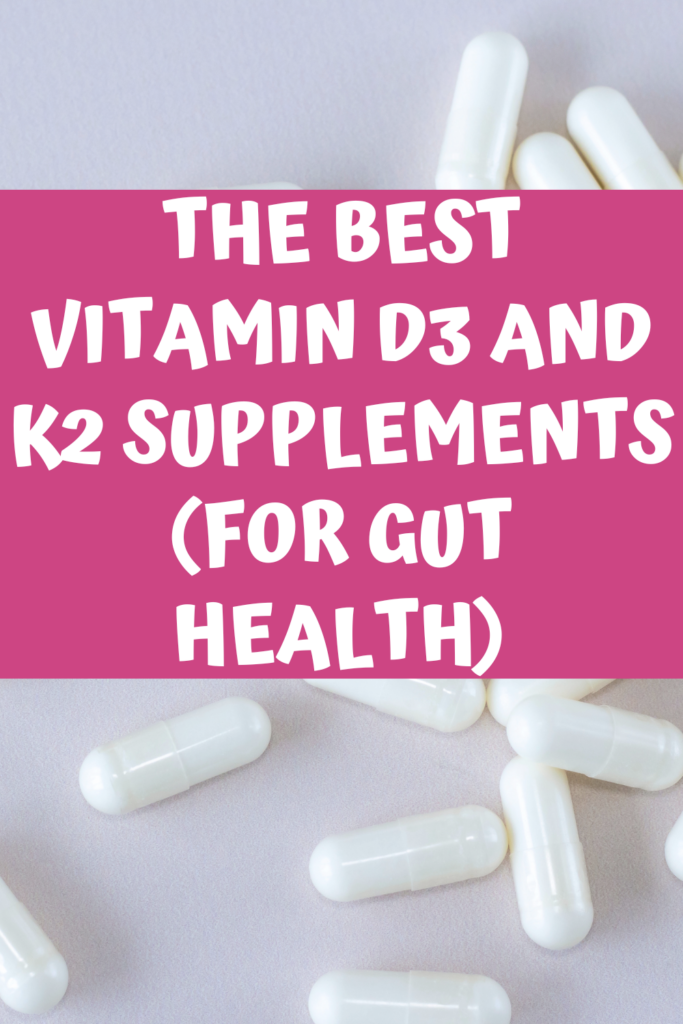
So what happens if you need to supplement? While getting nutrients from food is always optimal for overall health; it’s just not always attainable.
I’m a huge fan of supplementing, especially for those nutrients that play an important role in helping you live your best, gut-healthiest life!
Most health experts agree that taking vitamin D is crucial for your health.
After all, research shows that up to 80% of the American population is deficient!
That’s why taking some vitamin D is a smart idea.
But NOT if you’re taking the wrong form.
I’ll explain in just a minute, but first…
- You need to know the ROOT CAUSE of low vitamin D
- And WHY what you’re doing now isn’t making a DENT in your D levels
Let’s dive in.
The Biggest Reason Most People Have Low Vitamin D?
Answer: Lack of sunlight.
If you live north of 37 degrees North… It’s near impossible to get vitamin D from the sun during the winter months.
(That’s north of cities like Nashville, Richmond, and San Francisco)
I’m in Minnesota and I feel this deeply. It’s also why I got a Verilux Happy Light for the cold, dark and dreary winter days.
On top of that, most people are spending most of their time indoors anyways.
Plus, the older you are, the less vitamin D your body produces. This is why doctors typically recommend a Vitamin D supplement for older adults.
Low vitamin D comes along with a slew of nasty risk factors like…
- Bone problems
- Thyroid challenges
- A powered-down immune system
- Blood sugar issues
That’s because vitamin D is actually a hormone.
Unlike most vitamins which are only used by specific cells in your body, hormones work on every cell in your body.
Which is why so many systems can be damaged from low vitamin D.
Why Taking Any Kind Of Vitamin D Doesn’t Help
There’s actually two different forms of vitamin D – But nobody ever really tells you which one to take or why.
If you walk into your local grocery store, you’ll see the shelves lined with D2 and D3.
Which one do you choose?
Well, research shows that vitamin D2 is actually absorbed about 30% LESS than vitamin D3.
(Go back and read more on this above, if needed.)
So grab the vitamin D3 and you’re good to go right?
WRONG.
There’s still one crucial thing wrong with every single D3 supplement on the shelf… (And I do mean every single one!)
It’s not the dose…
It’s not the kind of pill or container it’s packaged in…
And it’s not whether it’s a solid or liquid form…
It’s the fact that the vast majority of vitamin D3 supplements leave out the most crucial “helper vitamin” that makes everything work.
Vitamin K
You see, one of vitamin D’s most important jobs is to help your body with calcium absorption.
But without vitamin K2, calcium can deposit in your brain, heart and other organs causing deadly “calcification”.
Doctors often equate calcification to scarring because it…
- Damages the function of the soft tissues being calcified
- Can be really hard to undo
So the addition of K2 is CRUCIAL, but there’s even more.
Not all forms of vitamin K are created equal.
Specifically, you need to ensure the types of vitamin K are in the form of “MK-7” (a.k.a. “menaquinone).
What’s special about MK-7?
It’s a NATURAL form of vitamin K2 – Not a synthetic one, which ensures maximum potency.
See, most manufacturers will cut corners and use some kind of synthetic vitamin K2…
And ALL synthetic K2s will lose potency the minute they hit the store shelf.
Where Can I Get The Perfect D3+K2 Combo?
Navigating all the choices and reading all the product labels can be hard work.
So I went ahead and did all of the hard work for you.
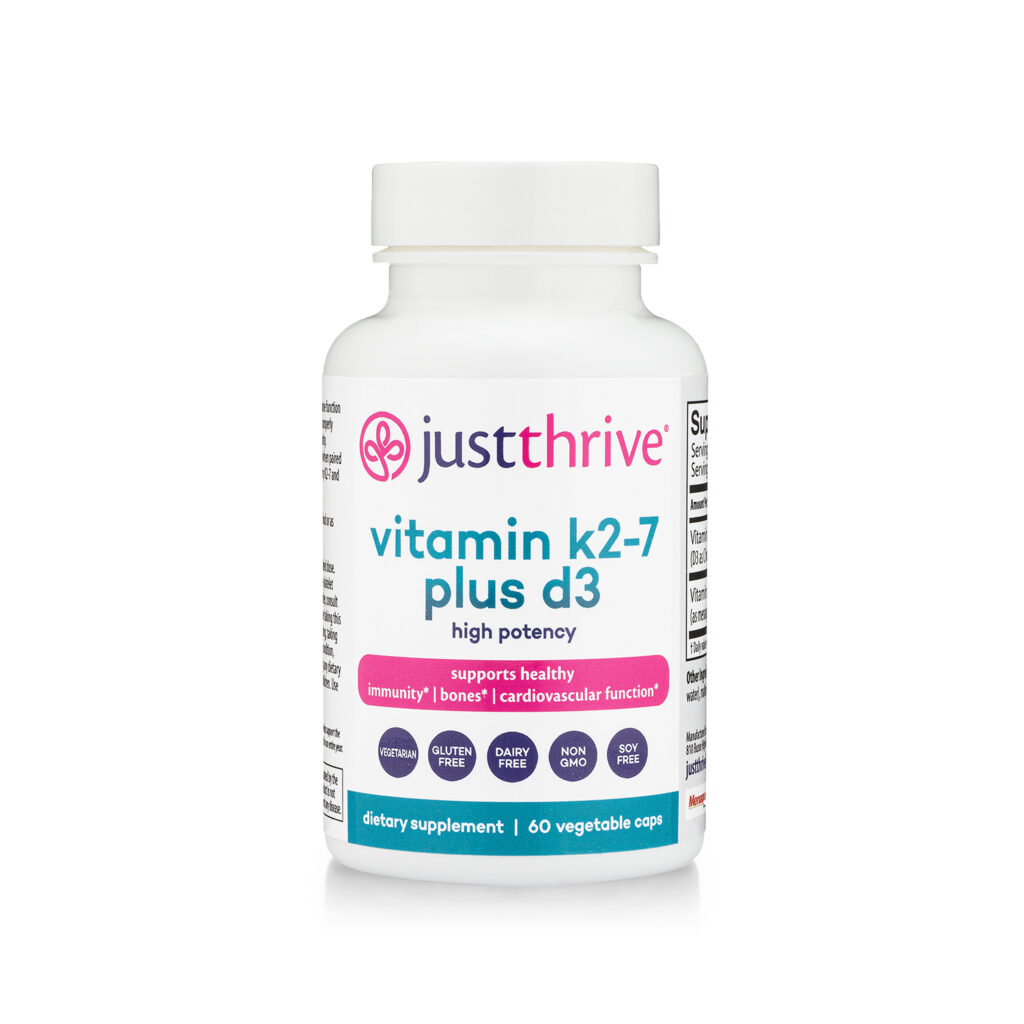
Just one daily vegetable capsule delivers 200 mcg of K2 and 5000 IU of 3.
Both in their highest potency forms to help you take control of your best health.
Use code AGUTSYGIRL at checkout to save 15%
But this isn’t just any D3+K2 combo
- Just Thrive’s D3 is the same form of D3 your body manufactures when skin is exposed to sunlight
- Just Thrive’s K2 is naturally derived from non-GMO chickpea natto. The High potency formula guarantees maximum bioavailability and potency*. It’s vegetarian, gluten-free, dairy-free, nut-free, soy-free, sugar-free
It ticks ALL of the boxes. But, it gets even better.
Your purchase of K2 Plus D3 is backed by a 100% money back guarantee.
If for any reason you’re not satisfied, simply request a full refund… At ANY time… No questions asked. (Even if the bottle is EMPTY!)
Lastly — One bottle will last you two months! So the choice is easy…
Note: Sometimes it’s hard to get this essential nutrient when you follow a vegan diet because many of them are animal products. However, the reason I believe the Just Thrive Health D3+K2 combo to be the best product is because it’s conducive for all diets.
Remember, when looking at vitamin D supplements, be sure you’re choosing the D3 form.
Here are some more options:
- Perfect Supplements has options HERE.
- You can also get Vitamin D3 + K2 supplements from: Seeking Health and Pure Encapsulations through my online dispensary, Fullscript HERE. In addition, if you want it in the liquid form, Dr. Amy Myers has one through Fullscript as well.
Any questions?
If you liked this post on the best Vitamin D3 and K2 supplements for gut health, you might also enjoy:
Sources: HERE, HERE, HERE, HERE, HERE, HERE, HERE, HERE, HERE, and HERE.
Xox,
SKH
🤰 bloating be gone! weight loss through optimal gut health for women
💃ʜᴇᴀʟ ʏᴏᴜʀ ɢᴜᴛ. ʜᴇᴀʟ ʏᴏᴜʀ ʟɪfe.
🫶🏻 founder gutbyome.com

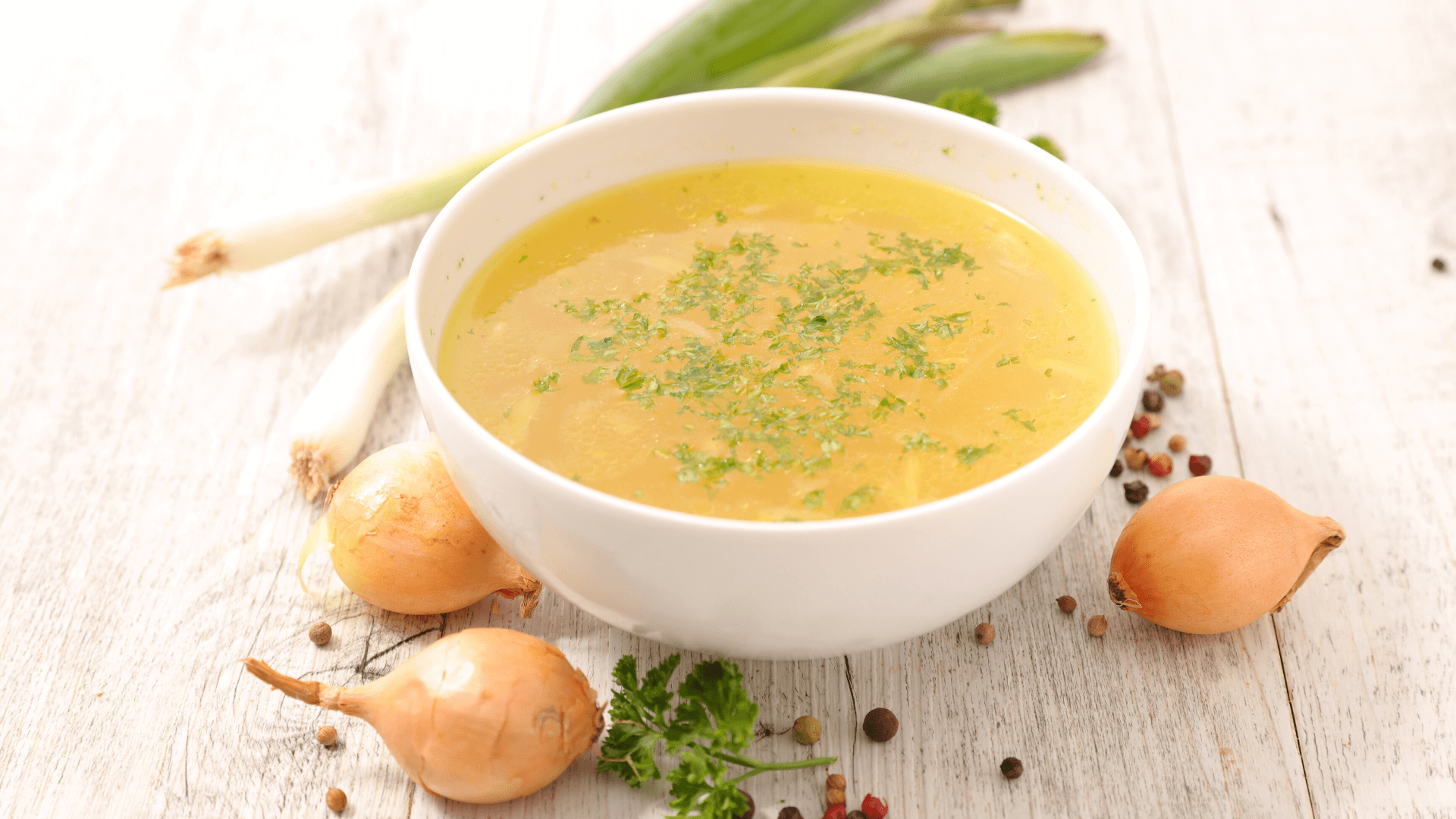



![What is a Health Coach [and how is an RD different?]](https://agutsygirl.com/wp-content/uploads/2020/05/food-nutrition-featured-agutsygirl.com_.png)
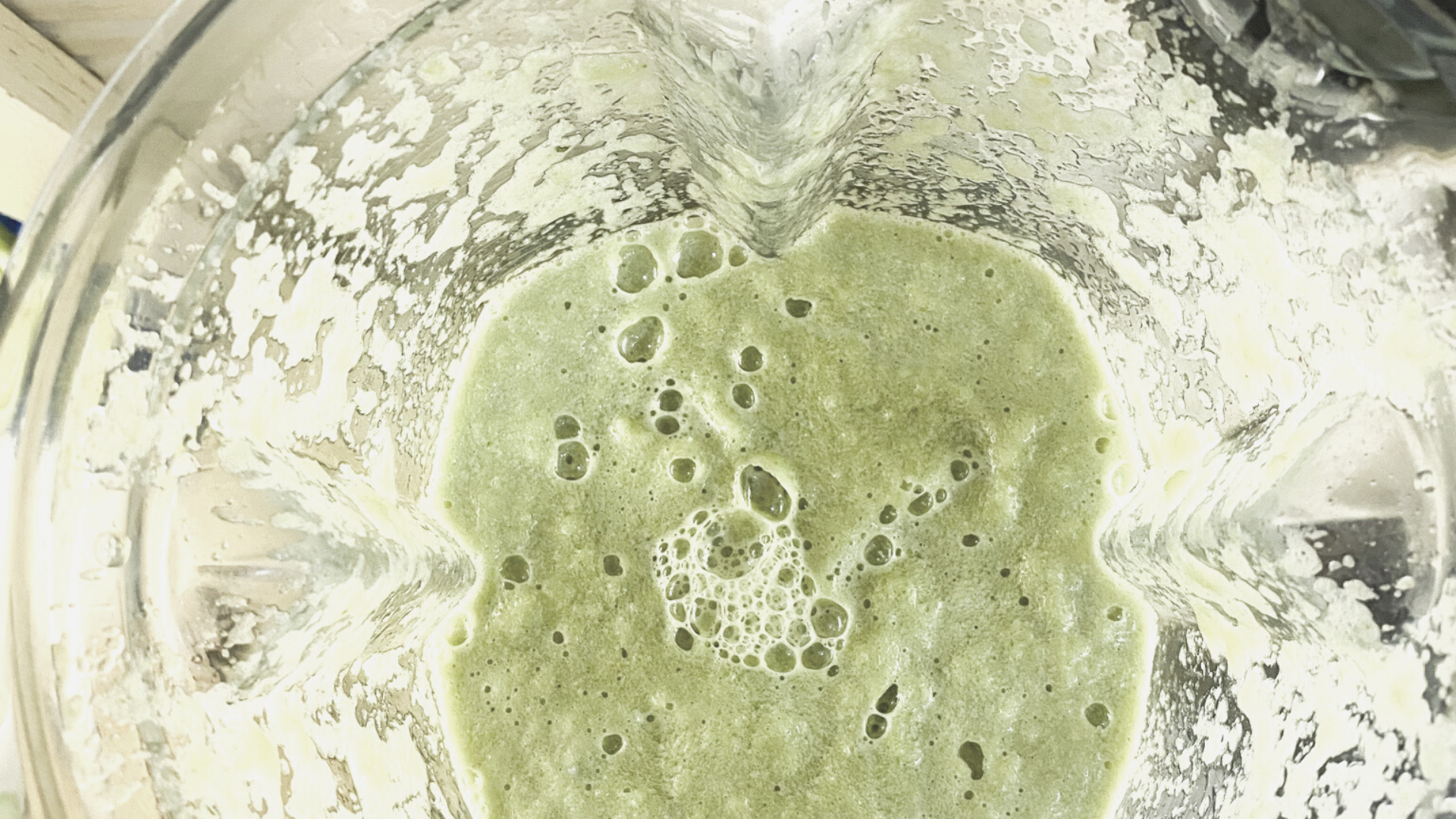
I have long history of IBS. I’m chronically vitamin D deficient as per my blood work. I’ve tried supplements but find they irritate my IBS. I also avoid gluten and dairy due to sensitivities. I’m currently tolerating cod liver oil, orange juice and eggs to increase my D levels. I often wonder if I have a malabsorption problem. Any further ideas would be helpful.
Hi! Try the other food items on the list. If nothing works, be sure to work with your doctor 🙂